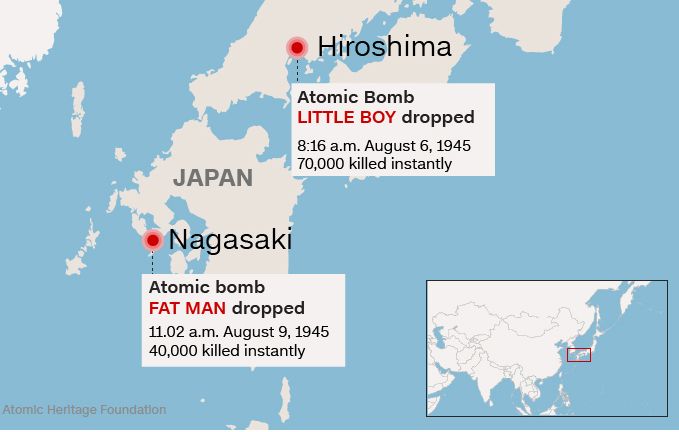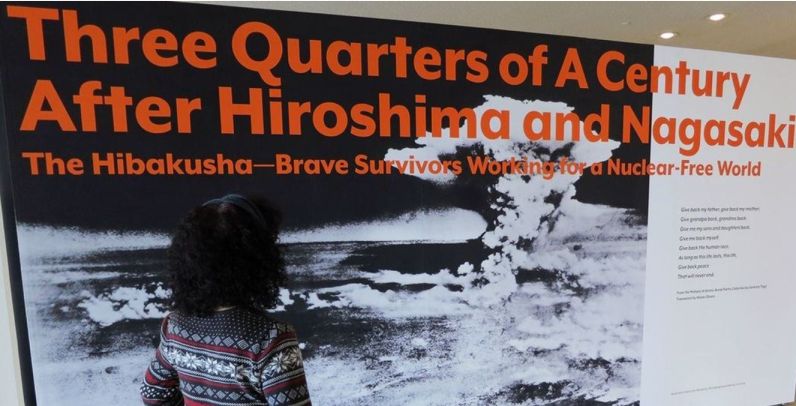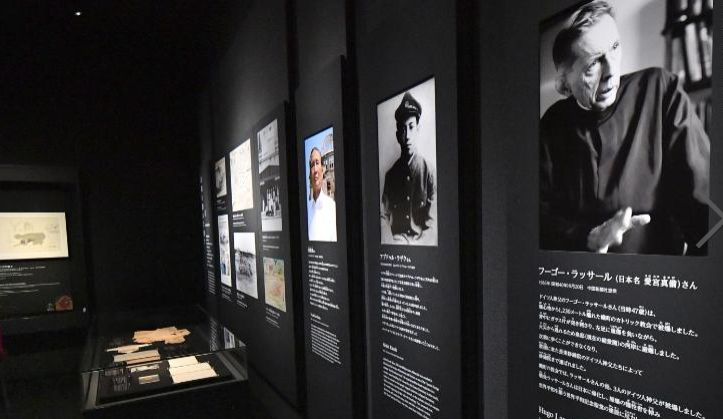By
Eric Vandenbroeck and co-workers
Harry Truman's character and view of the world
were different from Franklin Roosevelt's. Yet it must not be thought that
his sudden assumption of the presidency meant an instant change in America's
relations with Russia. True, when Truman received Molotov in the White House
less than ten days after he had become president, he spoke to this Russian in
solid words to which the latter said that he was thoroughly unaccustomed.
Truman's advisers instantly thought that the president's language was too
harsh, and the next day Truman thought it better not to press the issue (again,
it was mostly Poland) with Molotov. When Churchill, a few days after the German
surrender, implored Truman to take a harder line with Moscow (it was in that
letter that Churchill first used the phrase iron curtain), Truman did not
follow Churchill's urgings; another few days later, he sent Joseph Davies and
then Harry Hopkins to Moscow to try to iron out problems with
Stalin. During the Potsdam summit meeting in July,
Truman's behavior and his impressions of Stalin were still cordial and
positive.
Throughout 1945 (and even for two years after that), Truman did not
altogether abandon the hope of maintaining at least good relations with the
Soviet Union, and particularly with Stalin.
However, he had, commendably, few or no illusions about Stalin or
Russian ambitions or Communism. The following year, 1946, was marked by more
and more troubles with Russians and Communists, involving Iran, Turkey, Greece,
Yugoslavia, Berlin. In March 1946, Truman accompanied Churchill to Fulton,
Missouri, where Churchill delivered his famous Iron
Curtain speech (though the president and the State Department were careful
to state publicly that they were not necessarily associating themselves with
the former prime minister's views). By early 1947 Truman's decision was to
oppose further Soviet advances and aggressions and contain the Soviet Union and
Communism. By that time, Stalin had decided to proceed to the more or less
complete Communization of the countries that had fallen into his sphere of
interest in Eastern Europe. There was, as yet, no sharp conflict between the
Soviet Union and the United States in China or the Pacific.
Truman believed in American power and American righteousness. So did
his newly appointed secretary of state, James F. Byrnes. Byrnes was a longtime
Washington power broker, a former conservative senator from South Carolina,
Supreme Court justice, and wartime overlord of the American economy. Truman
liked Byrnes, who had befriended him as a new senator in the mid-1930s, and
thought him shrewd, knowledgeable, and challenging. He let Byrnes do most of
the contentious bargaining at Potsdam on German reparations, Polish borders,
and the composition of the new governments in Eastern Europe. Once Stalin
agreed in the first days of the conference to attack Japan, Truman felt
satisfied. "I've gotten what I came for," he confided to Bess on July
18. "Stalin goes to war August 15 with no strings on it. ... I'll say that
we'll end the war a year sooner now, and think of the kids who won't be killed.
That's the important thing."
To Truman and Byrnes, the atomic bomb meant more than the weapon to
defeat Japan and save American lives. It was a vast new instrument of American
power. Truman went to Potsdam not knowing it would work; Admiral Leahy said it
wouldn't; Byrnes thought it might, "but he wasn't sure." By all
accounts, and there are many, news of the successful testing of the bomb
enormously buoyed Truman's self-confidence. It "took a great load off my mind," he confided
to Joe Davies. The president did not order the atomic bomb dropped on Hiroshima
to impress the Russians, as some historians claim; nevertheless, he believed
that it would impress them and make them more manageable.
Truman quietly took Stalin aside at Potsdam and elliptically mentioned
that the United States had a powerful new weapon to use against Japan. Nothing
more needed to be said. Nor did all the pressing issues have to be resolved at
Potsdam. Truman was eager to go home. He grew impatient with the incessant
haggling at the conference. Stalin, he thought, was stalling. He "doesn't
know it," Truman again wrote his wife, "but I have an ace in the hole
and another one showing-so unless he has threes or two pairs (and I know he has
not), we are sitting all right." The
"atomic bomb," Byrnes also was thinking, "had given us great
power, and ... in the last analysis, it would control."

When Truman ordered that atomic bombs be dropped on Hiroshima and then
Nagasaki, these were not tough decisions. They were necessary, in his mind, to
save American lives. They vividly demonstrated American power; they confirmed
that enemies of America would pay for their transgressions. The Japanese did
pay, and then they capitulated unconditionally, except for the preservation of
the emperor. They had little choice, for Stalin's troops attacked
simultaneously, seized parts of Manchuria, invaded northern Korea, and set
their sights on Hokkaido, Japan's northernmost home island.
The war ended. The American people celebrated. Truman breathed a sigh
of relief. He now eagerly delegated peacemaking to Secretary of State Byrnes,
who he thought had performed ably at Potsdam. Truman wanted to turn his
attention to demobilization, reconversion, and the domestic issues he knew and
understood. Byrnes, for his part, was eager to take command of the nation's
foreign policy. He was sure of himself. He told his closest colleagues that the
atomic bomb was a great weapon that could be used to exact concessions from
potential adversaries. But experienced colleagues in the State and War
departments had their doubts. They deeply resented Byrnes's attempts to
monopolize American diplomacy. Many of them left office in September and
October 1945; however, Byrnes was in charge, exhausted from years of wartime
responsibility.
Byrnes was not as shrewd as he thought he was, nor was the Soviet Union
quickly threatened. At the first postwar meeting of foreign ministers in London
in September, Byrnes thought he could outmaneuver Molotov and arrange for more
representative governments in Romania and Bulgaria. But Molotov chafed at
Byrnes's procedural moves and sneered at his not very subtle efforts to use
America's atomic monopoly to leverage concessions. The Soviet foreign minister
was willing to negotiate on some of these points until Stalin ordered him to
stiffen his resolve. Let the conference end in deadlock, Stalin wired Molotov.
Let Byrnes stew for a while. Stalin's adulatory comments about Byrnes in front
of Truman at Potsdam had, typically, concealed the dictator's emerging contempt for a man who wielded power so flagrantly.
Byrnes returned to Washington chastened. The Russians would not be
intimidated, he realized. Perhaps, Byrnes now thought, the bomb could be used
as a carrot rather than a stick. Maybe the Soviets could be lured into a
favorable agreement to regulate the future of atomic energy. Some of the
Soviets' arguments, he believed, had merit. He conceded certain hypocrisy in
the American insistence that the Soviets open up eastern Europe while the
United States locked the Kremlin out of Japan. He could understand why the
Soviets feared the revival of German power and wanted friendly governments on
their periphery. It might make sense, he thought, to acquiesce to what was
happening in Bulgaria and Romania, more or less, if, in return, the Kremlin
promised to withdraw Soviet troops as soon as the peace treaties were
negotiated.
Moreover, a four-power treaty guaranteeing the demilitarization of
Germany might hasten this process. In other words, Stalin's obsession with
security might be assuaged by a demilitarization treaty. At the same time, his
domination of eastern Europe might be diluted by his agreement to withdraw
Soviet troops from Hungary, Romania, and Bulgaria, as they just had been
removed from Czechoslovakia.
An example from the WWII era of the rewriting of history is President
Truman's decision in August 1945 to drop atomic bombs on Japanese cities. As a
result of the president's decision, over 200,000 Japanese civilians were
slaughtered. This decision was justified at the time as necessary to prevent
the deaths of tens of thousands of American soldiers that would ensue from an
invasion of the Japanese islands.
President Truman decided to detonate atomic bombs over Hiroshima on
August 6, 1945, and Nagasaki on August 9, 1945, without consulting broadly with
his advisors.1 The majority of the members of the Joint Chiefs of Staff did not
believe at the time that dropping atomic bombs on Japan was warranted: Of the
eight five-star generals in the US military, only one – Marshall - thought the
bombing was justified.2 Postwar appraisals of Truman's decision by the leading
generals of the US military - Arnold, Eisenhower, Halsey, King, Leahy,
MacArthur, and Nimitz - concluded that dropping nuclear bombs on Japan was
unnecessary.3
There are several reasons for this consensus against dropping atomic
bombs on Japan among military leaders. Both American and Japanese officials
understood by the summer of 1945 that Japan had lost the war. The US military
had total, unopposed control of the skies and had blockaded the main Japanese
island. Because of the Allied bombing and the blockade, the Japanese government
had been rationing food since early 1945, but supplies were expected to run out
by November.4 In fact, the emperor feared that if the war did not end soon, a
domestic revolt would overthrow his dynasty.5
The Soviet Union was poised to invade the Japanese homeland to the
west.6 The Japanese particularly feared Russian occupation. Admiral Toyoda said
in a postwar statement that "the Russian participation in the war against
Japan rather than the atom bombs did more to hasten the surrender."
7
Recognizing the inevitable, Japanese officials had made numerous
overtures to the US government.8 Throughout 1945, the emperor and his advisors
sought assistance from Sweden and Portugal to negotiate a peace treaty with the
United States. On May 5, a cable from a member of the Admiral Staff of the
Japanese Navy stated that much of the Japanese military "would not regard
with disfavor an American request for capitulation even if the terms were
hard." 9 On July 13, another cable from the Japanese foreign minister
reported that the emperor was "mindful of the fact that the present war
daily brings greater evil and sacrifice upon the people of all belligerent
powers," and that he "desires from his heart that it might be quickly
terminated." 10
After Japan's surrender, Secretary of War Stimson commissioned an
interrogation of some seven hundred Japanese military, government, and industry
officials and concluded that "before December 31, 1945, and in all
probability before November 1, 1945, Japan would have surrendered even if the
atomic bombs had not been dropped, even if Russia had not entered the war, and
even if no invasion had been planned or contemplated." 11 Truman was aware
of the Japanese overtures and the content of the diplomatic cables. But Truman
did not respond to any of them.12
Despite what is written in most American textbooks, there were
alternatives to dropping atomic bombs on large population centers that
incinerated and fatally poisoned hundreds of thousands of civilian men, women,
and children. In our view, the best option would have been to wait. Stalin had
committed to Truman to declare war on Japan on August 15, including announcing
an invasion of the Japanese islands. The looming prospect of a Soviet invasion
might have prompted an immediate Japanese surrender. And Truman did not have to
drop the second bomb soon after the first. It was impractical for Japan to
negotiate a surrender with an unresponsive US president in the seventy-five
hours between the detonation of the first and second atomic bombs.

Of course, it cannot be known for sure how long Japan may have delayed
negotiating a surrender to end the war without the bombing of Hiroshima and
Nagasaki. The Japanese military was divided. Some wanted to fight on, but many
were willing to accept a peace that maintained the emperor's dynasty. (While
Truman demanded unconditional surrender, the United States supported the
Imperial Dynasty after the war, and the emperor's grandson sits on the Japanese
throne today.) The Japanese also knew that an invasion would likely cost tens
of thousands of American lives and believed this grim prospect gave them
negotiating leverage. And Japanese scientists at the time had correctly guessed
that the United States had only a few atomic bombs in early August. (A third bomb
would have been ready by August 21, and more would have followed in September.)
13
In any case, an invasion of the Japanese mainland would have occurred
at the earliest in late October or early November.14 Given the collapse of food
supplies, the threat of an overthrow of the Imperial Dynasty, and a threatened
Soviet invasion and occupation, a delay of even several weeks may have resulted
in a Japanese surrender. At a minimum, Truman could have paused for more than
seventy-five hours before dropping the second atomic bomb.
The fact is that Truman did not hesitate to order the detonation of all
the atomic bombs in the military's possession as soon as they were ready. But
it is doubtful the Japanese regime could have survived more than several months
without negotiating an end to the war. Hundreds of thousands of lives might
have been saved if Truman had delayed the detonation of atomic bombs over
Japanese cities until just before a planned invasion of the Japanese islands
later in the year. And Truman could have responded to the Japanese entreaties
for surrender.
But he did not. There is no evidence Truman considered even a short
delay or the possibility of peace.15
On August 9, after A second atomic bomb had incinerated Nagasaki,
Truman received a telegram from a Protestant clergyman, pleading with him to
stop the bombing. Truman's racist attitude toward the Japanese was no secret.
Truman replied, "When you have to deal with a beast, you have to treat him
as a beast." 16
The version of history recorded in most American history textbooks and
commonly repeated today is that the decision to drop bombs on Hiroshima and
Nagasaki in August was justified to avoid further American casualties. But
Truman could have waited, even for just a few weeks, and that might have saved
the lives of over 200,000 Japanese people. It might have even delayed the start
of the Cold War and the nuclear arms race that followed.

1. Background on the
decision to drop two atomic bombs on Japan comes from Huczko
(2014); Maciej. (2014. “Alternatives to Dropping the A-Bomb in Bringing the War
with Japan to an End.” Warsaw School of Economics. Vol. 1. No. 39. p. 128–137.
2. Ellsberg (2017),
Ellsberg, Daniel, (2017). The Doomsday Machine, Bloomsbury Publishing, New
York, Daniel, (2017). The Doomsday Machine, Bloomsbury Publishing, New York.
3. Frank (1999), and
Alperovitz (1995). Frank, Richard, (1999), Downfall, Penguin Books, New York,
Alperovitz, Gar. (1995). The Decision to Use the Atomic Bomb. Alfred A. Knopf,
Inc. New York.
4. The role of the
emperor and the Japanese government at the time comes from Bix (2000) and
Laquerre (2013).
5. Huczko (2014). “Alternatives to Dropping the A-Bomb in
Bringing the War with Japan to an End.” Warsaw School of Economics. Vol. 1. No.
39. p. 128–137.
6. Frank (1999),
Downfall, Penguin Books. New York.
7. Ellsberg (2017),
The Doomsday Machine, Bloomsbury Publishing. New York.
8. Huczko (2014), p. 133.
9. Huczko (2014), p. 131.
10. Huczko (2014), p. 131.
11. Frank (1999), p.
355.
12. Huczko (2014), p. 131.
13. Frank (1999), p. 303.
14. Frank (1999), p. 358.
15. Frank (1999), p.
303.
16. National Park
Service (2017). Bix, Herbert, (2000), Hirohito and the Making of Modern Japan.
Harper Collins, New York.
For updates click hompage here